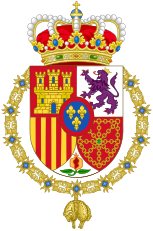Cuando la boda de Don Jaime con Emanuela Dampierre y Ruspoli el Rey meditó mucho lo que debía hacerse con respecto a este matrimonio, a todas luces de rango inferior. Estuve presente en varias de las discusiones para tratar el tema y la conclusión principal a que se llegó es que nunca debería darse el rango real a Emanuela y por tanto menos a sus posibles descendientes. Esto está confirmado por mi propio hermano Don Jaime en la carta que con hecha 23 de julio de 1945 me dirige, en la que textualmente, en su párrafo tercero, dice: «Precisamente para evitar toda posibilidad de futuras discusiones en cuanto a la indiscutibilidad del orden sucesorio, base fundamental de la legitimidad monárquica, cuando me resolva a contraer matrimonio con posterioridad a la renuncia que por mí y por mis descendientes había hecho a los derechos que me correspondían a la Corona de España, elegí mi esposa fuera del círculo de las Familias Reales, condición indispensable, según las seculares leyes de nuestra Patria y casa, para que nuestros descendientes puedan intentar reivindicar derecho alguno como tales personas reales.»
 but I can't find it. Can someone list the line for the crown of Spain for me. I was told that Prince William was in the line. Thanks
but I can't find it. Can someone list the line for the crown of Spain for me. I was told that Prince William was in the line. Thanks but I can't find it. Can someone list the line for the crown of Spain for me. I was told that Prince William was in the line. Thanks
but I can't find it. Can someone list the line for the crown of Spain for me. I was told that Prince William was in the line. Thanks


